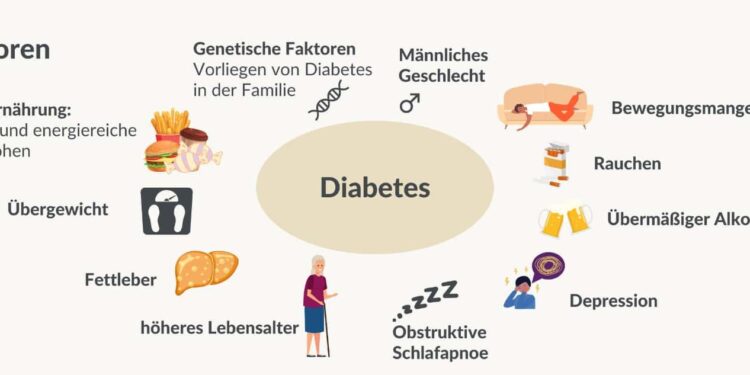Oklahoma is facing a growing health crisis as diabetes rates continue to rise across the state, raising urgent calls for increased attention to medication management and lifestyle changes. Health officials and medical experts emphasize the critical need for early diagnosis, proper treatment, and community support to combat this chronic disease that affects thousands of Oklahomans. This article explores the current state of diabetes in Oklahoma, the challenges patients face, and the steps being taken to address this major public health concern.
Diabetes Rates Surge in Oklahoma Prompting Statewide Health Alert
The recent uptick in diabetes cases across Oklahoma has become a pressing public health issue, with officials urging residents to prioritize early detection and management. Studies indicate that nearly one in six adults in the state now lives with some form of diabetes, a figure that has steadily climbed over the past decade. Experts attribute this surge to a combination of genetic predisposition, sedentary lifestyles, and increased rates of obesity. Medical practitioners emphasize that without prompt intervention, the rising prevalence threatens to overwhelm healthcare resources and significantly impact overall community well-being.
In response, statewide health initiatives are focusing on comprehensive care strategies, including:
- Medication adherence: Ensuring patients follow prescriptions to manage blood sugar levels effectively.
- Dietary modifications: Promoting nutrient-rich, low-sugar food choices to prevent complications.
- Regular physical activity: Encouraging consistent exercise to improve insulin sensitivity.
- Routine screenings: Increasing accessibility to early diagnosis through community programs.
| Metric | Oklahoma Rate | National Avg. |
|---|---|---|
| Adult Diabetes Prevalence | 16.5% | 10.5% |
| Obesity Rate | 36% | 31% |
| Physical Inactivity | 28% | 23% |
Experts Emphasize Medication Adherence and Regular Monitoring for Effective Management
Healthcare professionals consistently stress the critical role of medication adherence in managing diabetes effectively. Skipping doses or inconsistent intake of prescribed medicines can lead to dangerous fluctuations in blood sugar levels, increasing the risk of severe complications such as neuropathy, kidney disease, and cardiovascular issues. Experts advise patients and caregivers to develop routines that support timely medication consumption and to communicate openly with their healthcare providers about any side effects or challenges faced during treatment.
Equally important is the practice of regular monitoring through frequent blood glucose testing and scheduled medical checkups. This proactive approach allows for timely adjustments in treatment plans and helps track progress in lifestyle modifications. Key recommendations from specialists include:
- Maintaining a log of blood sugar readings
- Attending quarterly HbA1c tests
- Scheduling annual eye and foot exams
- Discussing lifestyle changes tailored to individual needs
| Monitoring Activity | Recommended Frequency |
|---|---|
| Blood Glucose Testing | Daily or as advised |
| HbA1c Testing | Every 3-6 months |
| Eye Examination | Annually |
| Foot Examination | Annually |
Lifestyle Changes Critical in Combating Diabetes Among Oklahoma Residents
Addressing diabetes in Oklahoma requires more than just medication; it demands a comprehensive shift in daily habits. Experts emphasize that dietary modifications, increased physical activity, and consistent health monitoring are essential steps for residents battling the condition. Incorporating nutrient-rich foods such as leafy greens, whole grains, and lean proteins can substantially improve blood sugar levels. Meanwhile, avoiding processed sugars and limiting saturated fats play a critical role in managing insulin resistance.
Physical activity is equally crucial, with healthcare professionals advocating for at least 150 minutes of moderate exercise weekly, including activities like walking, cycling, and strength training. Additionally, establishing regular sleep patterns and reducing stress through mindfulness techniques can positively impact blood glucose control. The table below highlights key lifestyle interventions proven effective in controlling diabetes among Oklahoma populations:
| Intervention | Recommended Frequency | Benefits |
|---|---|---|
| Balanced Diet | Daily | Improves blood sugar regulation |
| Physical Activity | 150 mins/week | Enhances insulin sensitivity |
| Sleep Hygiene | 7-8 hours/night | Reduces stress and stabilizes hormones |
| Stress Management | Daily practice | Lowers cortisol, improving glucose control |
In Retrospect
As diabetes continues to pose a significant health challenge in Oklahoma, experts emphasize the critical need for both effective medication management and meaningful lifestyle changes. Addressing this growing concern requires a combined effort from healthcare providers, community programs, and individuals alike. With increased awareness and proactive measures, Oklahoma can work toward reducing the impact of diabetes and improving the quality of life for those affected. The Norman Transcript will continue to monitor developments and share resources to support the fight against this chronic disease.










